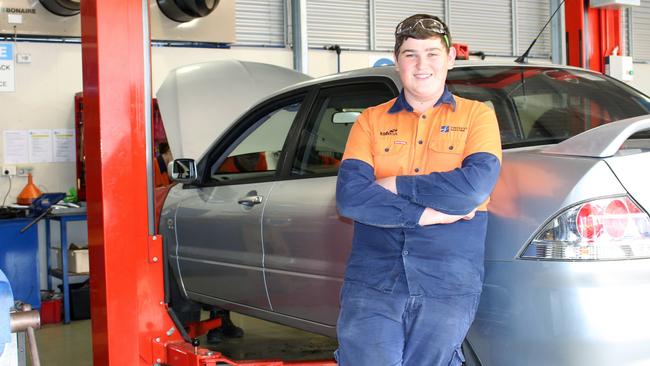School-based apprenticeships give students the skills to get work
Savvy students who start their trade careers before finishing high school are gaining a big advantage over other young people looking for work.
Careers
Don't miss out on the headlines from Careers. Followed categories will be added to My News.
COMPLETING a school-based apprenticeship improves the chance of finding full-time work in the years after graduation.
A National Centre for Vocational Education Research report states secondary students who undertake school-based apprenticeships and traineeships are among the most likely to be in full-time permanent employment five years after finishing school.
St Patrick’s Technical College apprenticeship and traineeship manager Alicea Sherrin says school-based apprenticeships allow students to gain practical skills at the same time as completing Year 12.
This makes them a well-rounded asset for any employer.
“Rather than dropping out of school to seek a (full-time) apprenticeship, they’re getting that higher (Year 12) level of maths and English or whatever subjects that they might be studying,’’ Sherrin says.

“There’s also a level of maturity that comes along with a school-based apprenticeship – the students are already out in a workplace so they understand the importance of punctuality, taking instructions from somebody senior and following those instructions.
“School-based apprenticeships and traineeships make students more employable regardless of whether they remain in that industry or find employment elsewhere.’’
Sherrin says school-based apprenticeships are becoming increasingly popular among students, particularly as schools become better at supporting the students by offering flexible class timetables.
Group training organisation WPC Group general manager Andrew Sezonov says school-based apprentices leave school with a skill level equivalent to those who have completed the first year of a full-time apprenticeship.

“So they have more skills when they’re starting (their post-school employment journey) but they have also demonstrated their commitment to skills training,’’ he says.
NCVER managing director Simon Walker says choosing a VET in School program that matches a student’s future career ambitions can make a “substantial difference’’ to their employment prospects.
He says research also shows students who undertake vocational education at school are motivated to study further, with most going on to complete higher level qualifications, including one-fifth of VET in School students who go on to gain a bachelor degree.
MORE NEWS
Qualified pet groomers are in demand by employers
The need for more barbers to be trained to keep men looking sharp
The most popular apprenticeships in Australia
Year 12 student Cameron Caruso has started a school-based apprenticeship at Flinders Port Holdings, undertaking a Certificate III in Heavy Commercial Vehicle Mechanical Technology.
Caruso enjoys the challenge of working on large engines and believes starting his apprenticeship at school has provided him with extra support – from both school teachers and his apprentice employer Maxima – as he undertakes his training.
“You learn a lot being at school – there’s things you may learn at school that you don’t necessarily learn in the workforce,’’ Caruso says.
“I definitely think finishing school and doing the apprenticeship are going to help my career later on.’’
